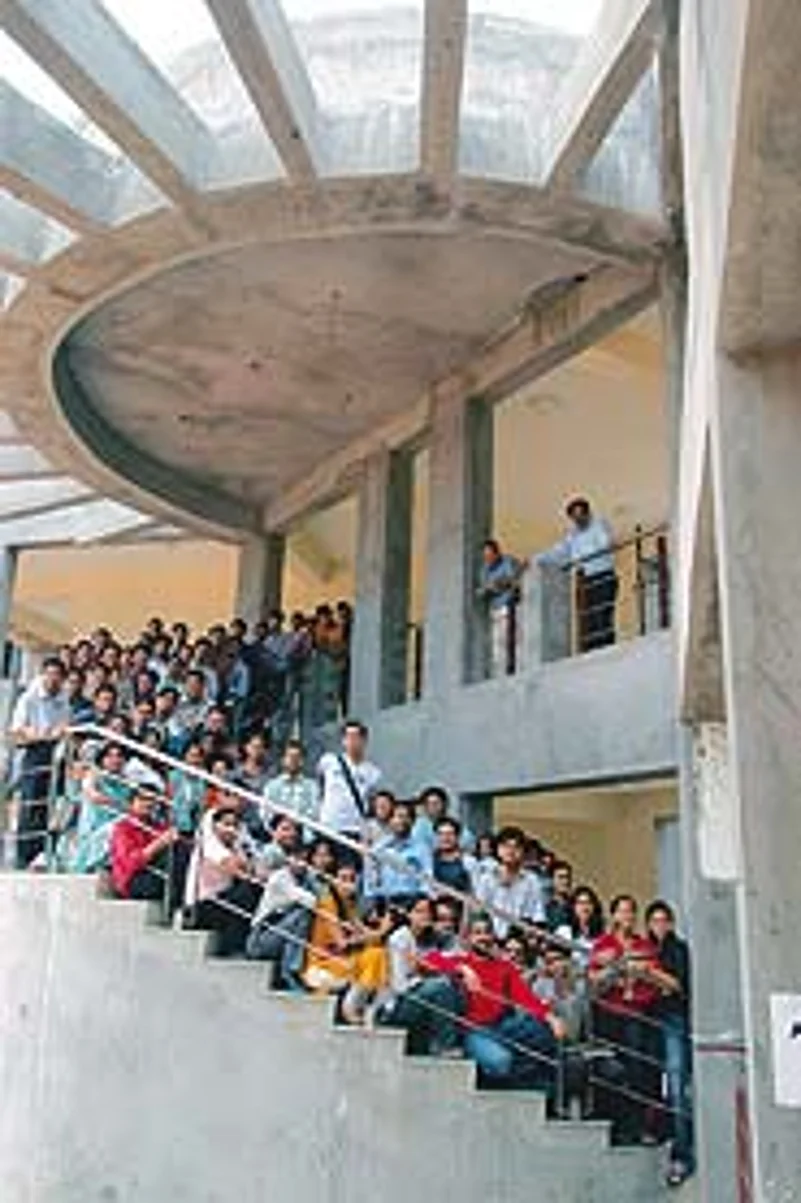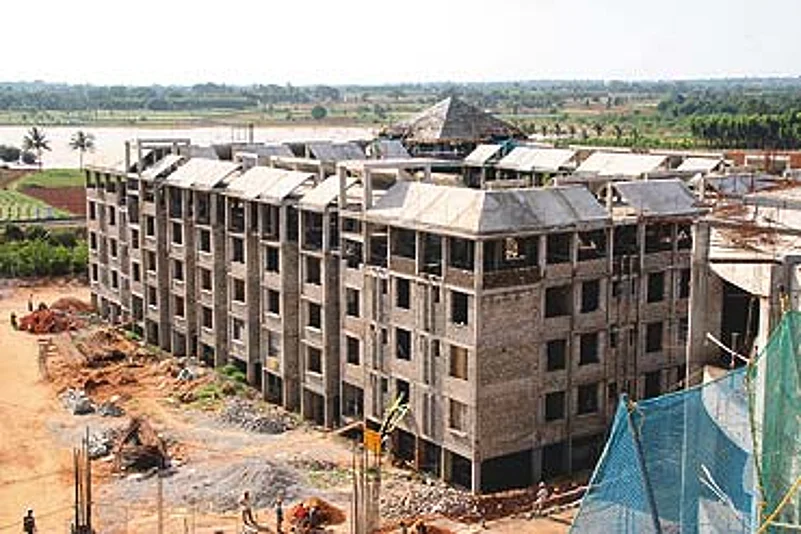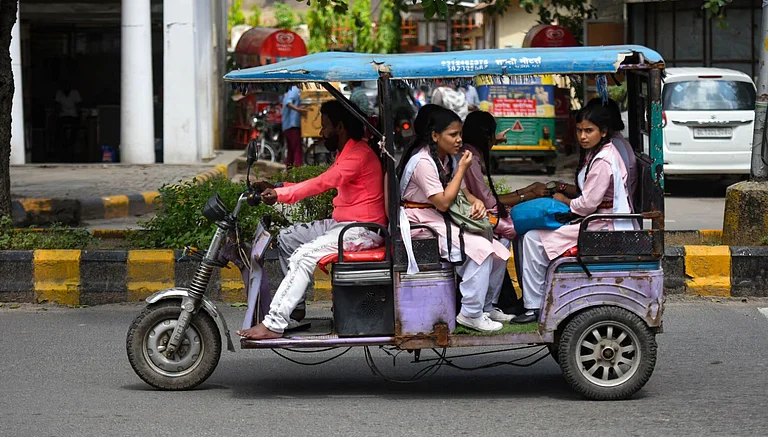To give his dream a concrete shape, Basant Kumar sent a team across India’s leading business schools to get inspiration from their tasteful designs and lofty concepts. A few years later, his wish culminated in the pristine seven-acre structure of Birla Institute of Management Technology (Bimtech) at Greater Noida. The mint-fresh campus, though smaller in scale and size and built at a tenth of ISB’s outlay, is inspired by nature and the sense of space that is visible and palpable at the Hyderabad B-school.
About an hour’s drive from Delhi, Bimtech’s architecture stands out in contrast to the concrete blocks surrounding Greater Noida’s institutional area that houses some of the new and upcoming technical institutions, including other business schools. As you enter the huge foyer of the building, which was opened about 20 months ago, there’s one thing that immediately strikes you. There are no electrical lights. The entire area is aglow with natural light, thanks to the almost 50 feet of glass facade that adorns the entrance.
The rest of the building is an extension of this concept. The terrace library is a huge mass of concentric circles and has huge windows around it to let the light in through the day. The central atrium is positioned such that it needs no artificial light or sound system, even when stage performers entertain the crowds. Says Bimtech director Harivansh Chaturvedi: "As management education is more interactive, the classroom furniture was designed to allow maximum interaction between the teacher and the students. We were inspired by the Kellogg’s School of Business and the Wharton School of Business, where they use a similar kind of U-shaped furniture."
Bimtech, like other new-age campuses, is built on the central theme of environment protection, energy conservation and use of natural light. The lavish interplay of green—every classroom opens out into a garden of sorts—is in stark contrast to the older schools which, like old-economy companies, are enmeshed in a heavy dose of brick and mortar. Bimtech now plans to expand its campus by 10 acres.

| ICFAI, Hyderabad, is hoping for a green rating by World Building Congress |
But ICFAI has taken the concept on to a different level. Its director D.S. Rao points out that special care was taken to ensure that energy and environment conservation were visible in every aspect of the campus. The operational classrooms use plenty of natural sunlight, which works quite well with the school’s 9-5 timetable. The ACs use ozone-friendly non-CFC refrigerants, the bricks are composed of fly ash and the furniture is either made of rubber wood or recycled wood. Even the water in the campus is treated and recycled to irrigate plants. A sewage treatment plant inside the campus ensures that the school does not pollute any of the surrounding water bodies.
Currently, only the first-year students people the campus, and they seem delighted with the mix of modern facilities and green environs. "This is a no-bike zone—which means we breathe fresh air all the time," says G. Subhadra, a student. Her batchmates respect the eco-friendly atmosphere at the school and one does not see anyone tossing a Coke cup or a napkin or gum carelessly on the paths. The complete campus, with eight amphitheatre classrooms, 22 lecture rooms, an open-air theatre, a 50,000-sq ft library and a seminar hall with a capacity of 300 is expected to be ready next March.
The scene is the same across the Deccan. The Alliance School of Business is building a 36-acre facility in Anekal, just outside Bangalore, which too will comprise ecologically balanced infrastructure, complete with over 8,000 trees and plants, and a 1.5-acre artificial lake.
The structure itself has a different look and feel with a distinct influence of Anglo-Saxon and Grecian architecture—the typical tall pillars, curves and domes. This, says the administration, has been done intentionally to bring about a sort of familiarity to overseas students. The new campus is expected to be ready by December.

Alliance B-school coming up off Bangalore
Says Sudhir G. Angur, president, Alliance Business School: "Care has been taken to decrease its environmental impact. The buildings are designed with natural north lighting and abundant ventilation. No motorised vehicles are permitted to ply inside the campus to keep it pollution-free; only bicycles are allowed."
Alliance and ICFAI are possibly the only two B-schools which have applied for green ratings from the World Building Congress. Apart from usual structures like a swimming pool and gymnasium, Alliance has a dance floor and running tracks for its students.
Explains Alliance director and executive VP B.V. Krishnamurthy: "This is a leadership institute and we have to promote a model of sustainable development. Our curriculum has an accent on holistic development. With the well laid-out path of business studies, we integrate disciplines like yoga. Having a green, airy campus is about having an open mind; the ambience contributes to the process of learning. Look at the sprawling campuses of the IT companies; they actually reflect a new work ethic and a new set of values, and we are similarly trying to innovate."
If Alliance, ICFAI and Bimtech are proud to showcase their campus, they better listen to the claims of the Pune-based Indian Institute of Modern Management (IIMM) which is in the process of shifting into its new campus located on the Bombay-Pune expressway. IIMM proudly announces that theirs will be one of the country’s best-equipped private B-school campuses. According to the institute’s top brass, creating the best infrastructure was a huge priority for the school, which is in the middle of its first full academic year in the new 12.5-acre campus, which will soon expand by another eight acres. Says A. Balasubramaniam, executive director, IIMM: "I was very keen to have a campus which no one else can have for the next ten years. When we want our students to be managers and leaders, we must give them infrastructure which allows them to think like leaders."

| IIMM, Pune, is being shifted to a new campus, to make it better equipped |
IIMM is also proud of its IT systems, which include over 600 Pentium-4 computers with licensed software and most importantly, 35 licensed SAP applications, which are taught not only to those doing systems concentrations, but also others at no extra cost. The new campus, to be built in nearly three years at a cost of Rs 70 crore, is expected to be complete by next year, but expansion plans are already under way.
Experts agree that while institutions like IIMs played a big role in raising the standards of management education and curricula, they gave little thought to the creative use of ecology on campus and connecting the students with nature. The new-age business schools have stepped in fill that void.
By Arindam Mukherjee in Greater Noida, Sugata Srinivasaraju in Bangalore, Saumya Roy in Pune and Madhavi Tata in Hyderabad






















